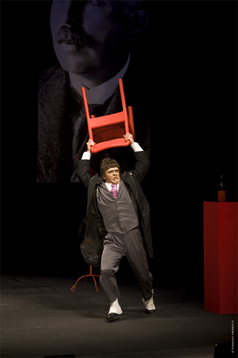The Gorilla and I

by Alejandro Jodorowsky
In my youth, when like a chrysalis in its cocoon, my mind was twisted in all directions painfully trying to overcome its limitations, to become an invisible and infinite butterfly, I read the incomplete story "Report to an academy" by Kafka. These few pages took away my hope hope: I felt like a sterile seed in the ground. It is no coincidence that the new seems unfinished: As the caterpillar could never succeed in taking off.
This is the sad story of a captured ape who, in order to avoid being exposed in a zoo, undertook the difficult task to acquire a human language, so to squeeze into a company that would eventually be demolished. His only success is rewarded by an academy university, which does not recognise it as a conscious soul, but rather admire him, as the beast can talk and imitate the attitude of an average man.
The gorilla is a Kafkaesque victim absolute. Like the immigrants who live in ghetto neighbourhoods - only tolerated to work the tasks/jobs despised by others, and are never fully appreciated or recognised as citizens in their own right.
It seemed to me that Kafka did not give the monkey an opportunity to speak, to revolt or to acquire the realisation that happiness is to be what we are and not what others require us to be.
Accordingly inspired by the original text of Kafka, I wrote a dramatic monologue, which shows the awakening of a spirit, first primitive, then vengeful and finally accomplished (i.e., aware of the futility of all this which seems to leads us away from authenticity.)
In a way, I myself (a child of Russian-Jewish immigrants stranded in Chile) suffered during my childhood from the rejection of a society that watched me as different, that can be extremely harmful / alienating for a child growing up.
The effort to integrate into a world that tolerates us, but we despise, is terrible. That is what is, "The Gorilla".
This story touched me so closely that I could only do it justice by giving it to my son, Brontis who although French by his mother, is an eternal emigrant from his father: As a child I shuffled him from one country to the other, constantly repeating, "your country is where your shoes are."
One can interpret it as the monkey, without territory, without family, without friends, is always having to embody a character to an audience that applaud him, that see him as a harmless monster.
Can a father and son work in harmony? This indeed was the case. We were so concerned by the subject, that we both saw ourselves in each other.
And when, in the final days of writing, we repeated the scene where the monkey finally revolts. We were both taken aback and deeply saddened when thinking about our own courageous ancestors - a long line of sad but valiant gorillas!
22 February 2009
In my youth, when like a chrysalis in its cocoon, my mind was twisted in all directions painfully trying to overcome its limitations, to become an invisible and infinite butterfly, I read the incomplete story "Report to an academy" by Kafka. These few pages took away my hope hope: I felt like a sterile seed in the ground. It is no coincidence that the new seems unfinished: As the caterpillar could never succeed in taking off.
This is the sad story of a captured ape who, in order to avoid being exposed in a zoo, undertook the difficult task to acquire a human language, so to squeeze into a company that would eventually be demolished. His only success is rewarded by an academy university, which does not recognise it as a conscious soul, but rather admire him, as the beast can talk and imitate the attitude of an average man.
The gorilla is a Kafkaesque victim absolute. Like the immigrants who live in ghetto neighbourhoods - only tolerated to work the tasks/jobs despised by others, and are never fully appreciated or recognised as citizens in their own right.
It seemed to me that Kafka did not give the monkey an opportunity to speak, to revolt or to acquire the realisation that happiness is to be what we are and not what others require us to be.
Accordingly inspired by the original text of Kafka, I wrote a dramatic monologue, which shows the awakening of a spirit, first primitive, then vengeful and finally accomplished (i.e., aware of the futility of all this which seems to leads us away from authenticity.)
In a way, I myself (a child of Russian-Jewish immigrants stranded in Chile) suffered during my childhood from the rejection of a society that watched me as different, that can be extremely harmful / alienating for a child growing up.
The effort to integrate into a world that tolerates us, but we despise, is terrible. That is what is, "The Gorilla".
This story touched me so closely that I could only do it justice by giving it to my son, Brontis who although French by his mother, is an eternal emigrant from his father: As a child I shuffled him from one country to the other, constantly repeating, "your country is where your shoes are."
One can interpret it as the monkey, without territory, without family, without friends, is always having to embody a character to an audience that applaud him, that see him as a harmless monster.
Can a father and son work in harmony? This indeed was the case. We were so concerned by the subject, that we both saw ourselves in each other.
And when, in the final days of writing, we repeated the scene where the monkey finally revolts. We were both taken aback and deeply saddened when thinking about our own courageous ancestors - a long line of sad but valiant gorillas!
22 February 2009

